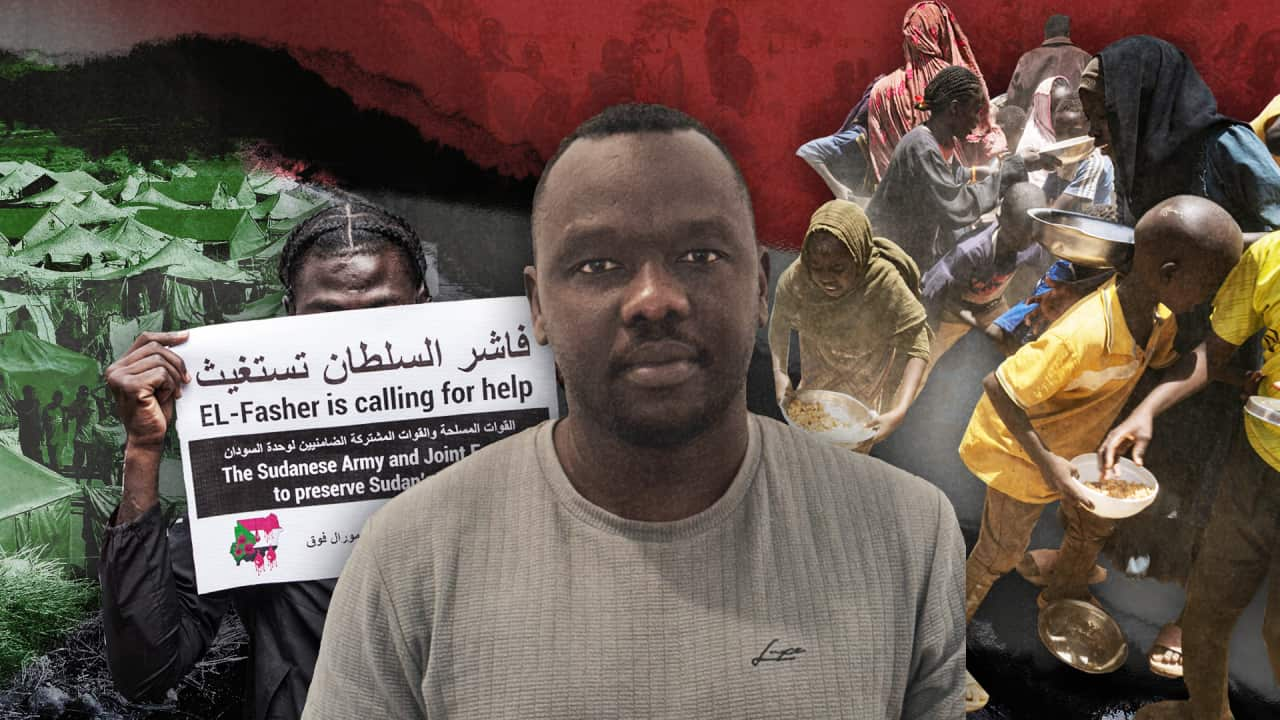Emad Mohamed, a Sudanese man living in Canberra, has said he feels "empty" after learning members of his family were killed, kidnapped, or reported missing during a deadly assault on a city in Sudan over the weekend.
The paramilitary Rapid Support Forces (RSF) seized the army's last major base in the Darfur region on Sunday, triggering a humanitarian catastrophe in Al-Fasher, the capital of North Darfur.
Hundreds have reportedly been killed in the city, including nearly 500 at a maternity hospital.
Mohamed told SBS News his in-laws were in Al-Fasher when the RSF started attacking the city's downtown area.
"We've had news confirming many people have been killed. Everyone I was in communication with on Sunday afternoon or Monday morning has been killed or gone missing," he said.
"We have family members, and my in-laws living in Al-Fasher, who have been taken or killed," Mohamed said.
He said he has a friend whose cousin was kidnapped in Al-Fasher and that the RSF is demanding a ransom for their release.
Years of conflict and loss have left him "speechless".
"I have no hope of what's happening and what's going to happen," he said. "I'm quite empty. I think this has become normal in our everyday life."
What's happening in Sudan?
Sudan plunged into a civil war in April 2023 after a vicious struggle for power broke out between its army and the RSF, once allies who jointly ousted long-serving president Omar al-Bashir in 2019.
After his removal, Sudan was governed by a joint military-civilian administration intended to guide the country towards democracy.
However, this fragile arrangement collapsed in October 2021 due to a coup led by Gen Abdel Fattah al-Burhan, head of the Sudanese armed forces and de facto president, with the support of his deputy, Gen Mohamed Hamdan Dagalo — widely known as "Hemedti" — the commander of the RSF.
The coup removed civilian administration leader Abdalla Hamdok and ended hopes for a peaceful transition to democratic rule.
Initially, Burhan and Hemedti appeared aligned in consolidating military control, but tensions soon emerged between them. A key source of friction was the plan to integrate the RSF into the regular army and the question of which group would lead, which led to the outbreak of war on 15 April 2023.
Since then, the United Nations estimates nearly 12 million people have fled their homes, and thousands have been killed.
Both the RSF and the army have been accused of committing war crimes — allegations both sides deny.
While Mohamed mourns the dead, he fears for the conditions of those still alive in Darfur.
"We are no longer fearing death, but we are fearing people going through torture," he said.
There is limited communication with people in Darfur, which Mohamed said makes it hard to verify exactly what is happening.
"The deaths are underreported; we are seeing estimates of between 1,800 and 3,000 deaths, and we need to multiply that by ten at least," he said.
Satellite evidence suggests tens of thousands of people have been killed, with a similar number believed to remain trapped in Al-Fasher.
Analysis by Yale University's Humanitarian Research Lab revealed door-to-door killings, mass graves, red patches and bodies visible on the city's berm, consistent with eyewitness accounts.
Mohamed, co-founder of the Sudanese-Australian Advocacy Network, said more resources are urgently needed to document the full extent of the conflict and its impact.
He established the network in 2023 to connect and support Sudanese communities in Australia impacted by the ongoing fighting.
Long-standing 'grievances'
Atem Yaak Atem, a South Sudanese journalist and former government minister, told SBS News the scenes in Al-Fasher are "very horrific".
He said Sudan has a long history of conflicts and "grievances" that date back to its independence in 1956, which led to a division between the Islamist North and Christians and other groups to the south.
"There has always been the question of power sharing and economic development. Groups have committed atrocities in the name of Islam, or the name of unity," he said.
Atem said the latest "atrocities" in Darfur are still being carried out, by the RSF in this case, with the intention to unify Sudan and bridge the gap between different political and religious groups.
The RSF has repeatedly denied claims that it is targeting civilians, despite allegations by the UN and other human rights agencies.
Many Sudanese people in Australia also condemn the killings, but Atem believes there is disagreement on how the country should be run.
"There are many people sympathetic to all the different groups and factions in Sudan. Some support the RSF, others support the army," Atem said.
"Some people are Islamic ideologically; others will support different movements."
'Urgent' intervention needed
Mohamed said there are reports of men fleeing the region to small towns nearby, but that many women and children have been "left behind" in Al-Fasher.
"Small groups have arrived in other towns, and the majority are men and young men," he said.
"We fear kids and vulnerable women have been left behind and are being killed.
"We've seen videos of mothers holding their children being shot."
Mohamed said the Australian government must "do what it can" to support people trapped in Al-Fasher and fleeing the Darfur region.
"If nothing concrete is done by Australia and the international community, the genocide will get worse," he said.
"There's an urgent intervention by the international community that is needed right now."
Around 177,000 civilians remain trapped in Al-Fasher, according to the UN's migration agency, after the RSF built a 56km earthen berm sealing off food, medicine and escape routes.
This story was produced in collaboration with SBS Dinka.
For the latest from SBS News, download our app and subscribe to our newsletter.

